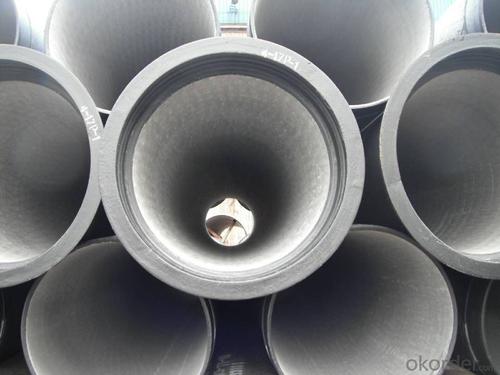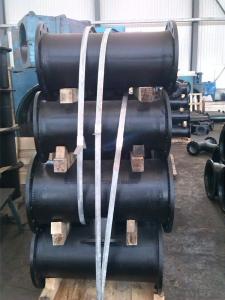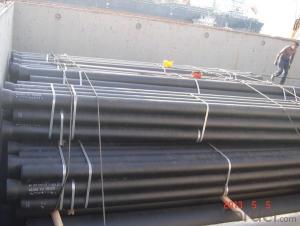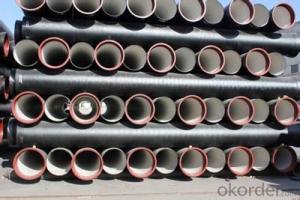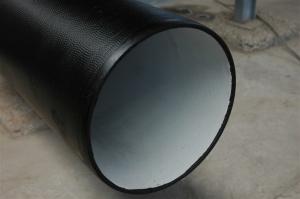DUCTILE IRON PIPE DN80
- Loading Port:
- China Main Port
- Payment Terms:
- TT OR LC
- Min Order Qty:
- -
- Supply Capability:
- -
OKorder Service Pledge
OKorder Financial Service
You Might Also Like
Specification:
1) The standard of pipe: ISO2531:1998, K9
2) Effective length: 6m
3) Inner cement line: Portland cement line as per ISO4179
4) Zinc coating: at least 130g/m2 as per ISO8179
5) Bitumen painting: at least 70um as per ISO8179
6) With 100% quantity of NBR ring, or SBR ring, or EPDM ring as per ISO4633
7) DN80mm-800mm
8) High strength, lighter than grey iron, good corrosion resistance, no furring, small flow resistance, easy fixing, long life tome about 100 yeas
9) Produced by Hangzhou chunfeng machine
10) Checked by automatic inspection equipment
11) Composition:
Chemical composition | |||
Chemical composition | Ductile Cast Iron Pipe (%) | Grey iron pipe (%) | Steel pipe (%) |
C | 3.5-4.0 | 3.2-3.8 | 0.1-0.2 |
Si | 1.9-2.6 | 1.4-2.2 | 0.15-0.4 |
Mn | 0.15-0.45 | 0.4-0.6 | 0.3-0.6 |
P | ≤0.06 | ≤0.3 | 0.02-0.03 |
S | ≤0.02 | ≤0.1 | 0.02-0.03 |
Mg | 0.03-0.06 |
|
|
12) Feature:
Mechanical properties | |||
| Ductile Cast Iron Pipe | Grey Iron Pipe | Steel Pipe |
Tensile Strength(Mpa) | ≥420 | 150-260 | ≥400 |
Yield Strength(Mpa) | ≥300 | No Confirmation | No Confirmation |
Bending Strength(Mpa) | ≥590 | 200-360 | ≥400 |
Elongation (%) | ≥10 | Neglected | ≥18 |
Brinell Hardness(HBS) | ≤230 | ≤230 | About 140 |
13) T type mechanical joint
14) Packing: in bulk or container
- Q: How are ductile iron pipes protected against mechanical damage?
- Various measures are implemented to protect ductile iron pipes from mechanical damage, ensuring their durability and longevity. One effective approach involves applying a protective coating to the exterior surface of the pipes. This coating acts as a barrier, safeguarding the ductile iron from physical abrasion, impact, and corrosion. Depending on specific requirements and environmental conditions, the coating can be composed of materials such as epoxy, polyethylene, or zinc. In addition to the protective coating, ductile iron pipes are designed with a high level of structural strength. They are manufactured to withstand significant pressure and external forces, making them less vulnerable to mechanical damage. The inherent strength of the material enables the pipes to resist deformation and cracking, even when subjected to heavy loads or ground movements. Moreover, proper bedding and backfilling techniques are employed during the installation of ductile iron pipes. This involves carefully placing the pipes in a prepared trench to ensure a stable foundation and minimize the risk of external forces causing damage. The correct backfill material is then used to provide support and prevent excessive pressure on the pipes. To further enhance protection against mechanical damage, additional measures such as concrete encasement or protective sleeves are often employed during the installation of ductile iron pipes. Concrete encasement involves surrounding the pipe with a layer of concrete, offering an extra layer of defense against external forces. Protective sleeves can also be utilized in areas prone to impact or where additional protection is necessary. Regular inspections and maintenance play a crucial role in ensuring the continuous protection of ductile iron pipes against mechanical damage. Periodic checks for signs of wear, corrosion, or other forms of damage enable timely repairs or replacements, preventing further deterioration. In summary, a combination of protective coatings, structural strength, proper installation techniques, and regular maintenance effectively safeguards ductile iron pipes against mechanical damage, guaranteeing their reliable performance and long lifespan in various applications.
- Q: Can ductile iron pipes be used for underwater installations?
- Yes, ductile iron pipes can be used for underwater installations. Ductile iron is a strong and durable material that can withstand the harsh conditions of underwater environments, making it suitable for various applications such as water distribution, sewage systems, and marine infrastructure.
- Q: An urban infrastructure construction, water supply pipe is ductile iron pipe and PE pipe, thank you
- Because the construction of municipal water supply pressure will be relatively large, generally used in the selection of pipe centrifugal ductile iron pipe, he has properties of iron essence and steel, excellent corrosion resistance, good ductility, good sealing effect, simple installation, ductile iron pipe is mainly used for municipal, industrial and mining enterprises, water supply, gas, oil etc.
- Q: Can ductile iron pipes be made into clear tubes?
- Of course, you can also use as a pipe, but because of the appearance of cast iron pipe is not very beautiful, but relatively brittle, by external impact or bad insulation cold winter break, so according to your use of the environment to determine.
- Q: How do ductile iron pipes handle thermal cycling in industrial applications?
- Ductile iron pipes are known for their exceptional ability to handle thermal cycling in industrial applications. Thermal cycling refers to the fluctuation in temperature that occurs during the operation of various industrial processes. These pipes are designed to withstand the stresses caused by thermal expansion and contraction, making them highly suitable for environments with significant temperature variations. One of the key characteristics of ductile iron pipes is their high thermal conductivity. This means that they can efficiently conduct heat away from the hot areas, minimizing the impact of thermal cycling. Additionally, ductile iron pipes have a low coefficient of thermal expansion, which means that they expand and contract at a slower rate compared to other materials. This helps to reduce the stresses imposed on the pipes during thermal cycling. Furthermore, ductile iron pipes have excellent mechanical properties, including high tensile strength and impact resistance. These properties enable the pipes to withstand the mechanical stresses that may arise due to thermal cycling. They can resist the formation of cracks or fractures, ensuring the integrity and longevity of the pipes in industrial applications. Moreover, ductile iron pipes have a high resistance to corrosion and oxidation. This is particularly important in industrial settings where the pipes may be exposed to aggressive chemicals or harsh environments. The corrosion resistance of ductile iron pipes ensures that they can withstand the corrosive effects of the process fluids and gases, even during thermal cycling. In summary, ductile iron pipes are well-equipped to handle thermal cycling in industrial applications. Their high thermal conductivity, low coefficient of thermal expansion, excellent mechanical properties, and resistance to corrosion make them a reliable choice for environments with significant temperature variations. These pipes can effectively withstand the stresses caused by thermal cycling, ensuring their durability and longevity in industrial settings.
- Q: What are the different types of joints used with ductile iron pipe?
- The different types of joints commonly used with ductile iron pipe include push-on joints, mechanical joints, restrained joints, flanged joints, and welded joints. Each type of joint offers different benefits and is used depending on the specific requirements of the installation.
- Q: Are ductile iron pipes suitable for gravity flow applications?
- Yes, ductile iron pipes are suitable for gravity flow applications. Ductile iron pipes have high strength and durability, making them ideal for carrying fluids under gravity. They can withstand the pressure and weight of fluid flow without the need for additional support or reinforcement. Additionally, ductile iron pipes have excellent corrosion resistance, which ensures their long-term performance in gravity flow systems.
- Q: Ductile iron pipes lined with cement mortar in the water (living water, water in the 6.9-7.3) in the early pH, why pH increased? How to solve this problem?
- The basic characteristic of ductile iron pipe of ordinary cement mortar lining the inner wall of the tube will make passivation, have antiseptic effect, but in the initial stage of using cement mortar lining will be the alkali component separation, so that the pH value of water increased to influence water quality
- Q: Can ductile iron pipes be made of flexible waterproof sleeves?
- Flexible waterproof casing is suitable for pipeline through the wall in vibration or by strict waterproof requirements of the structures of hardware fittings, general production enterprises according to the Construction Science Research Institute developed S312, 02S404 standard atlas manufacturing. The wall of flexible waterproof casing wall, in case of non concrete should be replaced by concrete walls, and a casing must be solidified on the wall; flexible waterproof casing application widely used in construction, chemical industry, iron and steel, tap water, sewage treatment and other units.
- Q: Can ductile iron pipe be used for underground applications?
- Indeed, underground applications can employ ductile iron pipe. Renowned for its robustness and endurance, ductile iron pipe proves to be well-suited for a multitude of underground uses, including water and sewage systems, gas pipelines, and irrigation systems. Its exceptional resistance to corrosion and external burdens renders it a dependable selection for underground installations, where sustained functionality and structural soundness are pivotal considerations. Moreover, ductile iron pipe's pliability enables it to endure ground shifting and settling sans fracturing or shattering, making it an apt choice for regions susceptible to seismic occurrences.
Send your message to us
DUCTILE IRON PIPE DN80
- Loading Port:
- China Main Port
- Payment Terms:
- TT OR LC
- Min Order Qty:
- -
- Supply Capability:
- -
OKorder Service Pledge
OKorder Financial Service
Similar products
Hot products
Hot Searches
Related keywords




